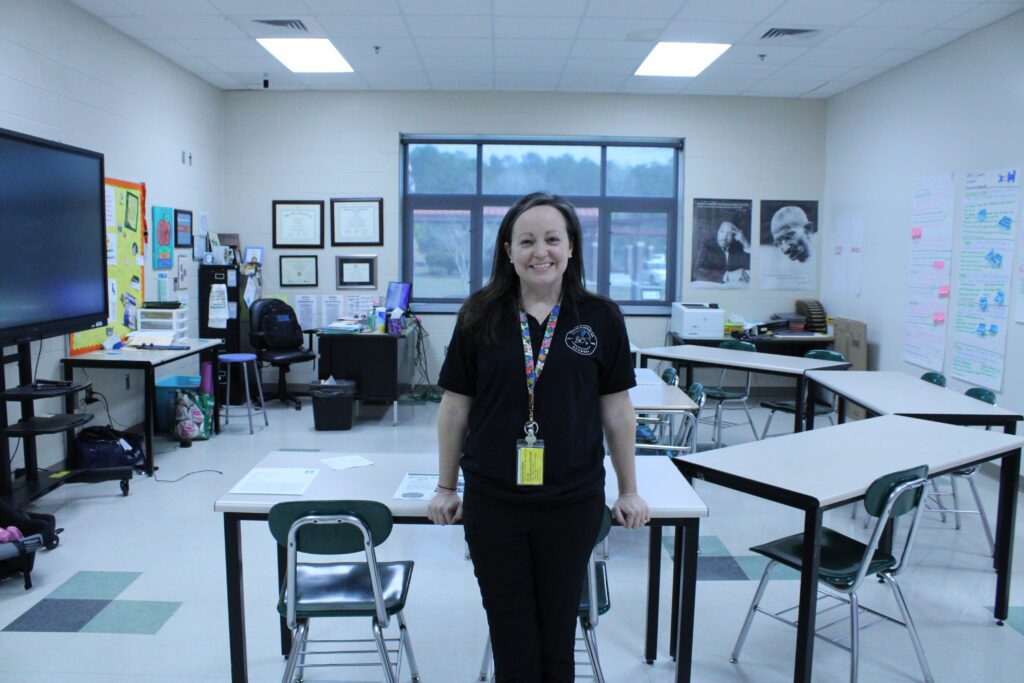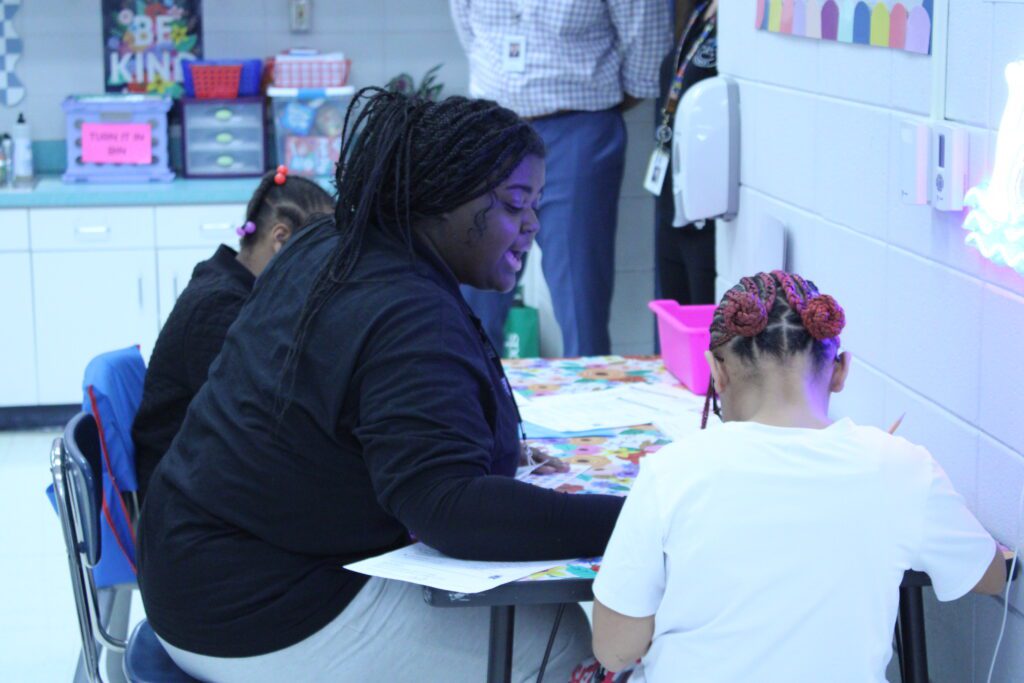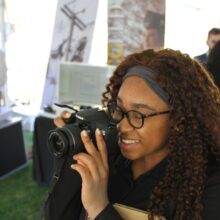Some school districts in North Carolina have decided that their best future teacher candidates may already be in the area — just still in high school.
These districts have begun their own iterations of teacher cadet programs, where high school students take introductory education courses and are placed with experienced teachers who train and mentor them. These initiatives, which fall into the category of “grow-your-own” programs, provide students with guidance, and sometimes financial support, as they pursue postsecondary degrees. The goal is to keep students connected with the communities they hail from so that they return as licensed educators after graduation.
EdNC spoke with students and staff from Brunswick and Wayne counties to learn more about the programs, what they’re like for students, and how they benefit students and districts alike.
More about the model
Students who participate in the BCS Teacher Scholars Academy at Brunswick County Schools or WCPS Teacher Cadet program at Wayne County Public Schools are eligible to receive credit for the college course EDU 187, an introductory educator course. To apply, both districts require that a student has at least a 2.5 GPA.
BCS started their program during the 2023-24 academic year. Their pipeline starts with students in middle grades who show interest in the profession, through their career development plans. Students can enroll in Teaching as a Profession I as an honors-level course as early as 10th grade.
By the time they graduate, students will have completed Teaching as a Profession I & II, as well as 120 hours of on-site experiences in the classroom at a BCS school. The courses and field internships are facilitated through the Career and Technical Education (CTE) Department. Their curriculum track is also paired with the CTE department’s child development course. All curriculum activities are taken at The COAST (The Center of Applied Sciences and Technology), the central building where the district offers its CTE courses.
At WCPS, students complete EDU 187 and EDU 216 as advanced placement (AP) courses that fulfill their elective requirements for high school and give them the potential to earn college credits.
As cadets, they also need 10 hours of co-curricular activities in the field of education. They also have to earn at least one microcredential in one of the following subject areas: anti-bias instruction, classroom culture, collaboration, formative assessments, and learner engagement.
Students take a mix of online and in-person instruction at Wayne Community College. The curriculum is meant for high school juniors and seniors. The district’s cadets are a part of a larger network of students that convene at an annual conference each year.
‘Brunswick County Schools is a great place to work and learn‘
Jennie Bryan, who leads the Brunswick academy, has a history of advocating to improve the state’s teacher pipeline.
She said students learn more from their on-site, classroom placements than they would from just Teaching as a Profession I instruction. If a scholar is struggling with a teaching strategy that they learned, the cooperating teacher they are placed with can give them real-time feedback.
“I think about my passions and my interests and I was just ready to explore a new chapter. And working on recruiting students into this profession was just something that I knew I was ready to do,” Bryan said.

When placing students, Bryan said she sought cooperating teachers who their principals thought were experienced, highly effective, and willing to mentor.
“I didn’t want anyone to feel like they had to take on an intern,” Bryan said. “I wanted them to willingly be excited and want that opportunity.”
Dessie Green, an exceptional children’s teacher at Southport Elementary School, told EdNC about her experience working with Taniyah Cobb, a senior in the Academy. Green said that Cobb is very inquisitive and on top of her game when it comes to working with students.
“And I love that sometimes we’re going up to the office, and I’m like, ‘Hey, this is how annual leave works. This is just like all the other things that are not lesson planning and day-to-day work with students, just about the job in general,’” Green said.
Melissa Whalen, a first grade teacher at Southport, said that teaching candidates are not typically brought into the classroom early enough. Through the academy though, that can start to change.
“I love that she’s had so much experience in the schools. She’s seeing how everything runs, and I feel like she’ll be so much more prepared for college, and definitely, hopefully she’ll be back here in Brunswick County, working here at Southport Elementary,” Whalen said about her mentee, Isabella Bullard.


Beyond academics and field experiences, Bryan said she leans on other experts to teach her students. For instance, she has brought in a panel of school social workers, behavior specialists, school psychologists, occupational therapists, physical therapists, and school nurses so they can learn just how many people it takes to run a school and support students.
Teaching as a Profession I largely focuses on understanding how the public education system works and its history. It also covers the psychology, philosophies of education, and how students learn. The Teaching as a Profession II course covers classroom management and lesson planning.
Then, the third step in the experience is a field experience course. Two or three days out of the week, students take their course with Bryan for two consecutive blocks. The other two days of the week students spend time at their school placement for the field experience.
If students complete the level two course and field experiences in their junior year, they can participate in BCS CTE internship in their senior year. For that internship, which is paid, students are placed in a different school or grade level from their field experience. Bryan said the district hopes to grow more interest in middle school placements as the academy grows.
Another way that BCS tries to feed into their teacher pipeline is by offering the Brunswick Built Teachers Scholarship. Through the scholarship, students matriculating to or currently enrolled in teacher licensure programs are eligible to receive $2,500 for up to four years, for a maximum award of $10,000.
Bryan does quarterly video calls with recipients of the scholarship program. She also curates a weekly newsletter for them and offers them opportunities to shadow in BCS classrooms. She said this communication is a part of, “just trying to stay connected and (to) let them know that there are people back here who want to support them and are looking forward to welcoming them back to our district.”
Even though Bryan knows all of the cadets will not decide to return to Brunswick County, she said she tells students the amount of support the prospective educators would receive in BCS is great.
“So I certainly feel comfortable saying to my students, ‘Brunswick County Schools is a great place to work and learn, and we would be honored for you to come back and work and learn with us,’” she said.
Bullard, the mentee, who is also a senior enrolled in the academy, said she looks forward to her experiences in Whalen’s classroom.
“The highlight of the day during my field experience is walking in the classroom and all the children just come up and hug me, and they tell me if their birthday is coming up, or if something happened at home. And I look forward to teaching my small group,” Bullard said.
Bullard and Cobb said they had a good balance between their work in the academy and their other obligations as students.
“This is really a great program for if you really want to become a teacher, because you see what teachers go through, either on day basis or for a few hour increments. But it definitely opens your eyes to see that teachers are more than just somebody who’s just standing there,” Cobb said. “They’re helping kids who might be having troubles at home — they’re literally the kids’ support system all the way through.”
‘Give back to where I came from’
“What makes someone decide to become a teacher?” EdNC asked Jasaan Umar Williams, a senior at Charles B. Aycock High School in Wayne County.
“I joined the program my junior year because I decided that I wanted to be a teacher — because (of) the teachers in my past; most definitely my guidance counselor back in Maryland,” Williams said. “He basically changed my whole outlook on life, and how I should be raised and how a man can have emotions and all that. So I want to be that to the younger generation.”
The program Williams referred to is known as TEACH Wayne, WCPS’ teacher cadet program.
According to a district announcement, students interested in becoming teachers can become a teacher cadet and take college level courses through the Career College Promise (CCP) program.
Cadets also have hands-on learning opportunities with students in pre-K all the way through high school, the program website said. The TEACH Wayne program has partnerships with three higher education institutions: Wayne County Community College, University of Mount Olive, and East Carolina University, according to the district.
As program leaders recently welcomed new “teacher cadets,” three program alums shared about their experiences in the program and where it got them.
By going out into the field, graduates said they were introduced to a lot of different educators throughout Wayne County. Now in their current roles, the alums said they already have stablished many relationships throughout the district.
“I would not have had the opportunities I had without being in the program. I received several scholarships and then ended up going to NC State, which would not have been an opportunity without that support,” program alum Katie Dodson said. “And I am also a substitute teacher. So it’s kind of opened the door to come back into my own county and give back to where I came from.”
Dodson was one of 12 students selected for the North Carolina State University College of Education’s Transformational Scholarships Program. She became a NC Teaching Fellow award recipient along with TEACH Wayne alum Breana Kearney. They are currently college students at N.C. State University and East Carolina University, respectively.
In April, Bullard and Cobb, from BCS, learned they will also become teaching fellows, as part of the state’s 2025-26 cohort, along will fellow scholar Johaana Bryant. The program offers forgivable loans of up to $10,000 per year to qualifying students committed to becoming licensed and teaching elementary, STEM, or special education classes in North Carolina public schools upon graduation.
Reagan Joyner, another cadet alum, recently graduated from Wayne Community College and is part of the school district’s apprenticeship program. Right now, she is placed in an elementary school classroom. She said she would not have known about the opportunity to be an apprentice if it wasn’t for TEACH Wayne.
“It’s helped a lot preparing me for going into the classroom and actually being head of the classroom,” Joyner said.
More about the N.C. teacher pipeline
Like the BCS Teacher Scholars Academy, TEACH Wayne offers classes at no cost to the student, with cadets required to provide their own transportation for any outside excursions. Overall, all three of the alums said the program was flexible with a manageable workload.
“And I know when I was in the program, we were always willing to give each other rides if we needed it. And everybody’s always supportive of each other,” Kearney said.
When asked about meaningful moments they had as cadets, the alums highlighted activities that showed them different aspects of being an educator. For instance, Dodson shared a time the students learned about Maslow’s Hierarchy of Needs and how they apply to students.
A highlight for Kearney was attending the statewide conference for teacher cadets. Specifically, Kearney got to speak at the conference while serving as a state officer.
“Really the goal of it is to just try and bring… all the teachers, (all the) Cadet students from across the state together in one big group, and show them that, ‘Hey, there’s all these other people that are doing the same thing as you,’” Kearney said.
The alums agreed that being cadets helped prepare them on their journey to becoming teachers, and leading the next generation.
“It was a little bit of a struggle at first, but I feel like it was definitely something that after a month or two, it’s just a daily thing now, like, this is your job,” Joyner said. “You feel like you’re 30 years old. It’s a lot, but it is really rewarding. The kids that you meet and the relationships you build with them really do matter.”
You can learn more about the WCPS Teacher Cadet program and BCS Teacher Scholars Academy on their websites.





